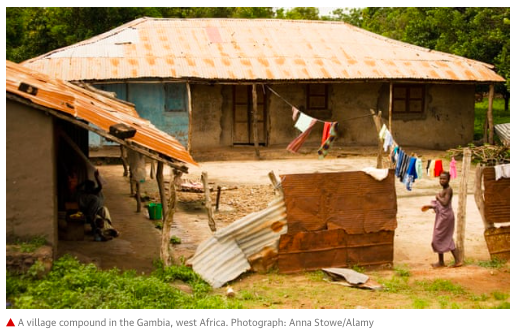Housing quality 'vital to tackling malnutrition and poor growth in children'
 ‘Stunting’ in children may only be ended if they are brought up in higher-standard homes, Gambia study finds
‘Stunting’ in children may only be ended if they are brought up in higher-standard homes, Gambia study finds
Malnutrition and stunting in children – poor growth that affects both body and mind – may only be ended if they are brought up in higher-standard homes with hot and cold running water, new research suggests.
Ridding the world of stunting is a major global health target. More than 160 million children are malnourished and small for their age. Huge efforts have been made to ensure children in poorer countries are breastfed and get nutritious food in the crucial first two years of life and to improve the water they drink and sanitation in their homes. But two big, well-conducted studies have recently shown that these programmes do not help children grow after all.
A small study in the Gambia may have revealed why. A team from the London School of Hygiene and Tropical Medicine looked at the growth of children whose parents worked for their Medical Research Council (MRC) unit in the small village of Keneba.
Among 230 children, the researchers found that the socioeconomic status of the parents – their wealth or poverty, education and income – made only a small difference to the chances of the children not growing as well as they should. What made a difference was the type of housing they lived in.
Annual incomes ranged from $50 to $20,000 per family. Housing ranged from very basic mud block huts to western-style houses with hot and cold running water, showers, flushing toilets, electricity and gas cooking. Children raised in western-style housing grew very well, and none of this group were stunted or underweight. But those raised outside the campus of the MRC unit, where animals roamed freely and water was not on tap, fared substantially less well and were well below average height and weight even though their parents were well educated and had good, secure incomes.
Andrew Prentice, professor of international nutrition at MRC Unit the Gambia at the London School, who led the study, published in BMC Medicine, said there are profound implications if the conclusions are right.
The recent results of the Shine (sanitation, hygiene, infant nutrition efficacy project) and Wash Benefits studies into nutrition, hygiene and sanitation programmes in villages were really disappointing, he said. “These trials were done extraordinarily well – they are great trials. They have really done a great job. This is what the answer is. We all have to scratch our heads and ask why, and what’s next?”
The results suggest that either hygiene does not matter or that the interventions – such as teaching families about hand-washing and ensuring their water is clean – are not enough. “Our data show that the latter is the likely explanation,” said Prentice. “We were on the right lines. We just didn’t do enough.”
As people become wealthier, child growth ceases to be an issue for countries, he pointed out: “It sorts itself out because people have aspirations to much better houses. It’s not that people want to live in unhygienic conditions. They are forced to by poverty. They build themselves lovely houses with piped water.”
The country that cracked its stunting crisis
Read more
Their study was a “natural experiment”, looking at child growth in a situation where families were living in a variety of different conditions. It was small – Prentice would like to see it replicated on a larger scale if at all possible.
But if the conclusions are right, we need to be more ambitious, he says. “Poor people have the right to much better living conditions. I’m not one to bang on about human rights, but I do think it is a human rights issue,” he said. “We have got to stop working on the principle that we can only do very cheap interventions. In a way, that is insulting to our fellow man.
“The takeaway message from our research is that there’s a very high threshold of hygiene necessary to allow children to grow properly – communities need improved living conditions and access to clean water piped into their homes. These findings should redirect governments’ priorities, shifting efforts to providing drastically better housing, and better access to clean water.”
By: Sarah Boseley









